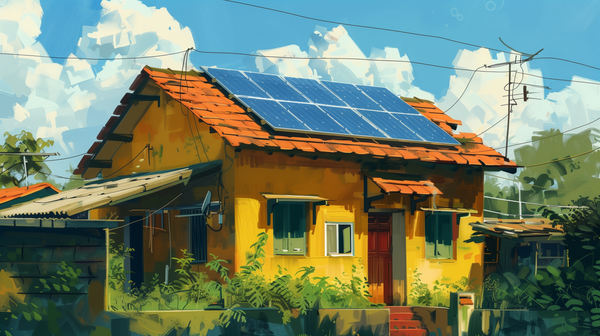Wildfire smoke apocalypse aside, air quality is a story of progress

"One day your youngest daughter develops a nasty cough. Smoke from the indoor fire is weakening her lungs. You can’t afford antibiotics, and one month later she is dead. This is extreme poverty." — Factfulness, Ten Reasons We're Wrong About The World - And Why Things Are Better Than You Think, Hans Rosling, Ola Rosling, Anna Rosling Rönnlund.
With millions living in Canada and the United States suffering abysmal indoor and outdoor air quality as a result of hundreds of wildfires burning in Quebec, it’s easy to forget that most humans were subjected to crippling indoor air quality for nearly all of history. Our mastery of fire as hunter-gatherers provided warmth for heating, cooking, and forging tools; however, it also made air pollution part of our daily lives. As humanity transitioned from hunting and gathering to settled farming, we took our fires with us into our enclosed dwellings, bringing the resulting air pollution with it.
Indoor heating and cooking obviously have enormous practical value and undoubtedly improved living standards; a warm shelter and a hot meal are certainly better than shivering with cold soup. The fire and resulting heat aren’t the issues, but rather incomplete combustion and the smoke and toxic particulate byproducts produced that wreak havoc on health and wellbeing. Civilization’s long history of indoor air pollution has been a history of slowly transitioning to cleaner heating and cooking fuels, with families adopting cleaner fuel sources as swiftly as technology and income would allow. The first fuels we harvested from nature were also the most inefficient, producing the least heat per unit and the most pollution, crop waste, plant material, dung, wood, and later charcoal and coal. There has always been a direct link between the quality of heating fuels and their cost, and thus, poorer families have, by economic necessity, been exposed to the greatest burden of indoor air pollution. Over the last hundred years, global economic growth has allowed tens of millions of families to switch from poor-quality solid fuels to less polluting liquid and gas fuels and, ultimately, to natural gas and electricity where available and affordable. As countries transition from low and middle-income to high-income, both indoor and outdoor air pollution decreases.
Today indoor air pollution, largely generated by burning solid fuels in and around the home, remains a driver in reducing life expectancy and increasing child mortality for poor families living in low and middle-income countries, most particularly impacting women, children, and the elderly. In 2019, indoor air pollution was estimated to claim roughly 2.4 million lives annually, comprised mainly of people living in the world’s poorest regions in Africa and Southeast Asia, totaling some 4% of all deaths globally. The good news is that global economic growth is fueling, quite literally, the solution to improving indoor air quality for the world’s poor, namely access to cleaner fuels. This transition is having a profound impact on death rates from indoor air pollution, as well as lifting living standards by freeing women and children from the arduous task of gathering and processing solid fuels for heating and cooking each day. In the two decades between 2000 and 2020, the share of the global population with access to clean fuels for heating and cooking grew from just 49% to 69%, helping reduce the burden of air quality-related disease and death considerably.
Between 1990 and 2019, the annual number of premature deaths attributed to household air pollution from the use of solid fuels for cooking fell by a little over two million deaths. That’s a reduction of nearly fifty percent globally in just three decades, and the trajectory is continuing in the right direction; with each passing year, more families are able to make the switch to life-saving, cleaner-burning fuels. The story is much the same for outdoor air pollution, where, the world over, civilization has gone through three distinct phases. In the first stage, early industrialization powered by coal and other hydrocarbons, limited or absent environmental regulation, and inefficient and polluting manufacturing processes belch high levels of air pollution into the environment. In the second stage, countries begin transitioning from low-income to middle-income and high-income status, and in doing so, they improve regulation, remove or reduce highly polluting sources of manufacturing, and generate considerably reduced air pollution. Finally, in the most highly developed countries, pollution regulation, paired with gasification and electrification, improves air quality further.
The story for outdoor air pollution in the developed world is much the same; economic growth and regulation have allowed the world to experience a remarkable reduction in many of the harmful air pollutants harmful to human health and damaging to the environment. Progress on improving both outdoor and indoor air quality has, unfortunately, been neither equitable nor universal, and it is the world’s poor, living in low and middle-income countries, that still suffer the most today. If there’s one statement that can be made about indoor and outdoor air pollution, it is that individual wealth and a country’s GDP determine to a large degree, how much pollution the average individual living in the region will suffer. Better economic opportunity at the individual and national levels equates to cleaner air almost every time. Progress forward on air quality is certainly not progress completed, and today indoor and outdoor air pollution combine to claim the lives of roughly 6.8 million individuals in 2019, leaving much room for improvement before we can celebrate victory over air pollution.
The optimistic story is that much of the developing world is moving, albeit slowly in some cases, toward cleaner air, a fact that’s saving millions of lives annually. And while that is little comfort for those suffering under blankets of toxic wildfire smoke in Canada and the United States, it’s worth being thankful that air pollution, which used to be the norm in the industrializing world, is now the exception for much of the developed world.





